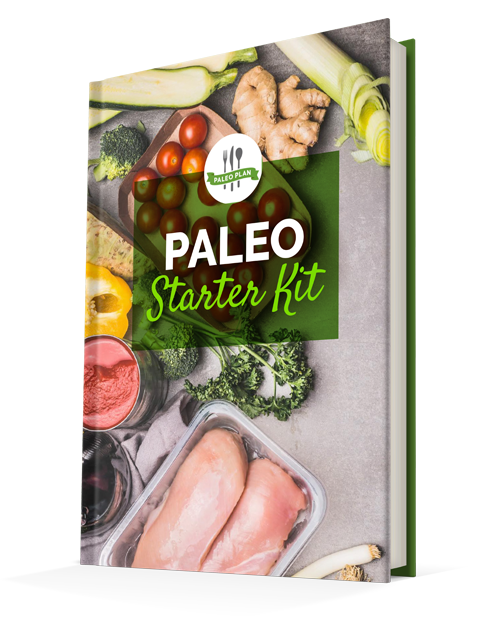
The kidneys are two bean-shaped organs that sit around the middle of the back. Most people don’t give their kidneys much thought unless there’s an issue, but by that point, the pain can be excruciating. There are specific nutrients and foods that can keep these little organs working effectively and efficiently, and we want you to know about the best Paleo foods for kidney health (complete with recipes to get you started).
What Do Kidneys Do?
Kidneys filter and collect toxins from the blood—effectively, they are trash collectors for the body, sending the waste byproducts down the urethra and out the bladder. Kidneys can function effectively or ineffectively, but the amazing thing is that the human body really only needs one. Kidneys are susceptible to damage, particularly from the effects of high blood pressure. Kidney function can also suffer from overuse of NSAIDs or physical trauma, as well as a genetic predisposition to kidney disorders.
Lifestyle and nutrient intake can dramatically support and benefit the ability of the kidneys to properly do their job. A Paleo diet allows for kidney-supportive eating by reducing foods and additives that can strain the kidneys, and by promoting nutrient-rich foods that will enable the kidneys to be strong.
Water

While most wouldn’t consider water to be a food, keeping your body hydrated is the number one best thing you can do for renal health. Urine that is properly diluted will be able to more effectively filter and remove toxins, but when the body becomes dehydrated, you are at an increased risk of developing kidney stones. The more diluted your urine is, the healthier your kidneys will be. Drinking filtered water is the primary way to stay hydrated, but herbal teas, green teas, and coconut water can all contribute to your body’s daily hydration needs. If you’re not sure how much you should be drinking, you can start with the tried-and-true half your body weight in ounces, but some will need less, and others will need more. You can use your urine as a guide: when clear, light, and mostly transparent, hydration needs are most likely met.
Cranberries

Cranberries are known for their tart, slightly bitter taste, and as such may not be commonly seen on the tables of many apart from Thanksgiving. They are, however, extremely rich in antioxidant support and have an anti-inflammatory effect on the whole body. Cranberries benefit the kidneys in particular because of the active sugar in them: d-mannose. This simple sugar doesn’t affect the body in the same way that glucose does, but instead, it works to help prevent bacteria, especially E. coli, from thriving in the kidneys, bladder, or urinary tract. Cranberries are a whole food way to support the kidneys preventively, but in severe cases of kidney or bladder infection, supplemental d-mannose can be equally or more effective than antibiotic treatment. Cranberries also are good sources of fiber, vitamin K, vitamin E, and vitamin C.
Featured recipe: Cranberry Relish
Enjoy this quick cranberry relish at any time of year, although we admit that it pairs nicely alongside a Paleo Thanksgiving dinner. Add a seasonal flair to a meal any time of year, and give your kidneys a nice supportive boost, too.
Beets

Beets are one of those ubiquitous vegetables that you see popping up in Paleo posts on the internet, but which many at-home Paleo eaters remain largely confused about. A root vegetable with an earthy taste, beets are one of the highest dietary sources of folate, along with numerous other nutrients like manganese, magnesium, and iron. Beets are known for their vivid, red coloring, but some varieties are also white or yellow. Most people assume that beets are a tough root vegetable that needs cooked for a long time to be palatable. Beets, like most other vegetables, can be steamed lightly or can be roasted in less than an hour. The greens that are often attached to the beet root are also edible, and taste similar to Swiss chard, which is a member of the same plant family. Beets offer a perfect nutrient blend to benefit detox organs, specifically the liver and kidneys.
Featured resource: How to cook beets
Onions

Onions are a food that people seem to either love or hate. Rich in biotin, a B vitamin that is notable for its benefits for hair, skin, and the nervous system, onions are also plentiful in manganese, copper, and vitamin B6. Onions have their signature “odor” due to the allium compounds in them, which are sulfur-like, and responsible for their strength and the way that they often bring tears to people’s eyes when slicing them. Even when just consumed 1 or 2 times per week, onions can relay their anti-cancer, anti-inflammatory, and antiviral health benefits to your body. Onions are rich in quercetin, which is beneficial for cardiovascular health, and thiosulfinates, which prevent the growth of bacteria and other harmful organisms, supporting the liver, kidneys, intestines, and colon in the process.
Featured recipe: Roasted Squash with Red Onion and Rosemary
This savory side dish is simple to execute, but packed full of earthy goodness that pairs well with any main dish or enjoyed as a tasty snack on its own. Use any kind of onions, or mix-n-match.
